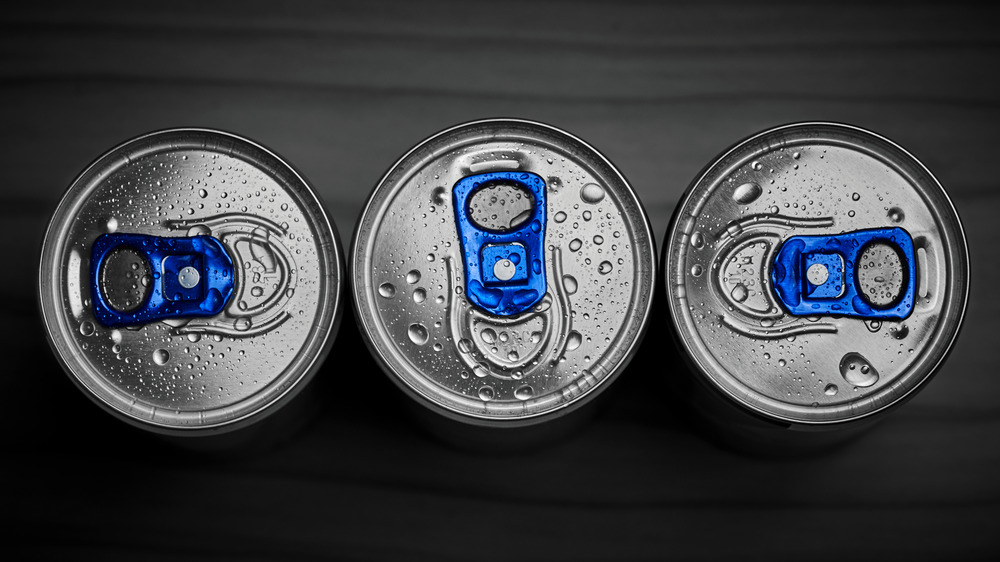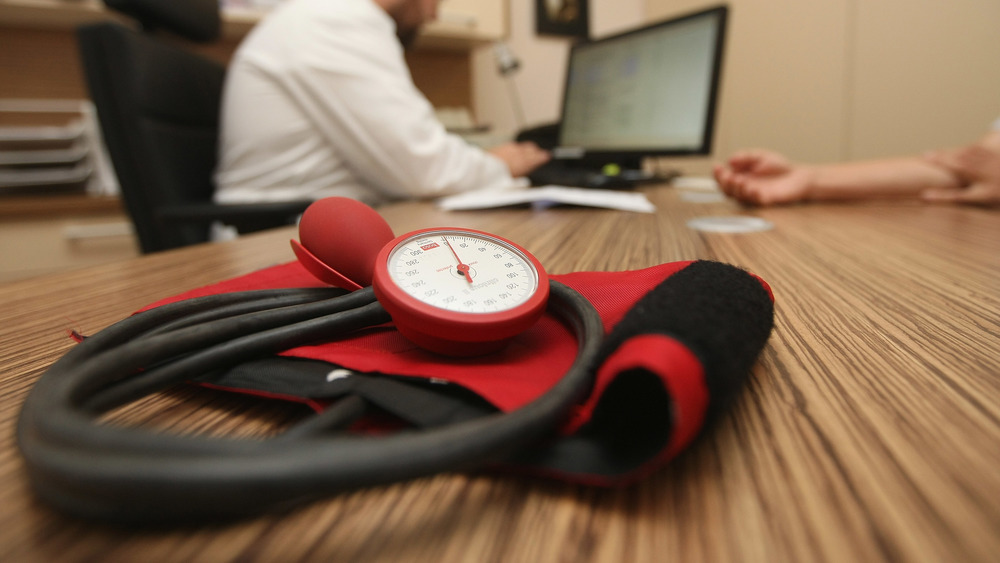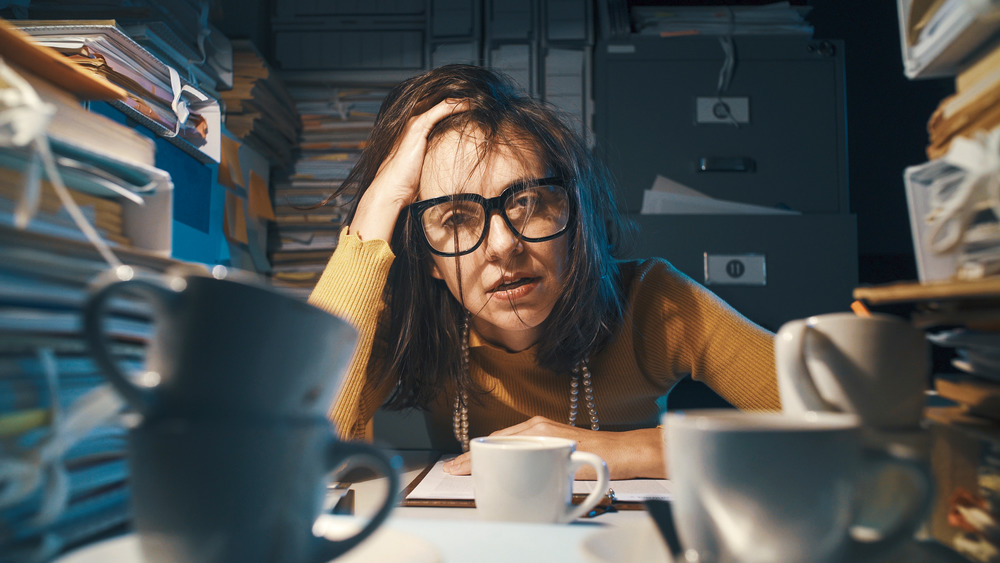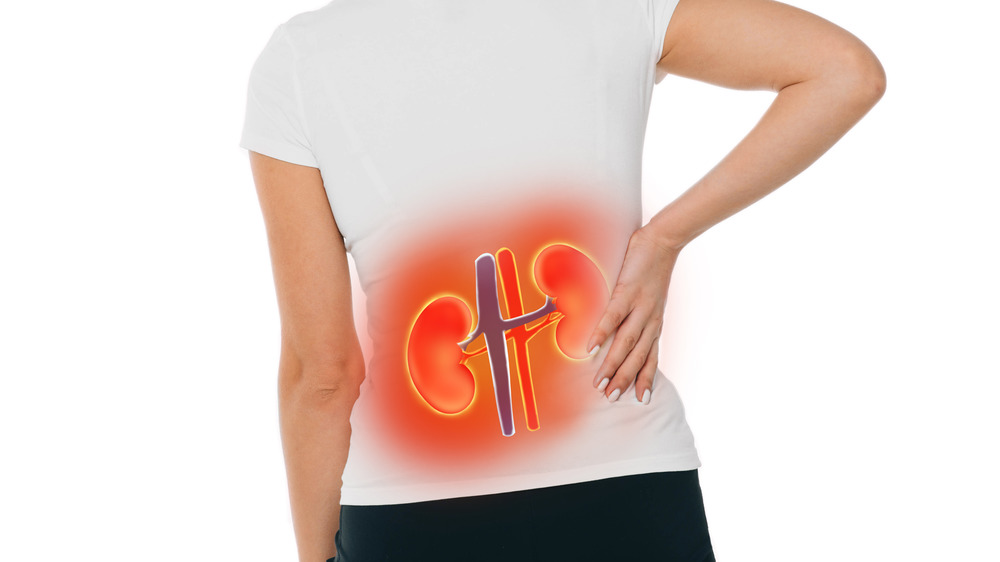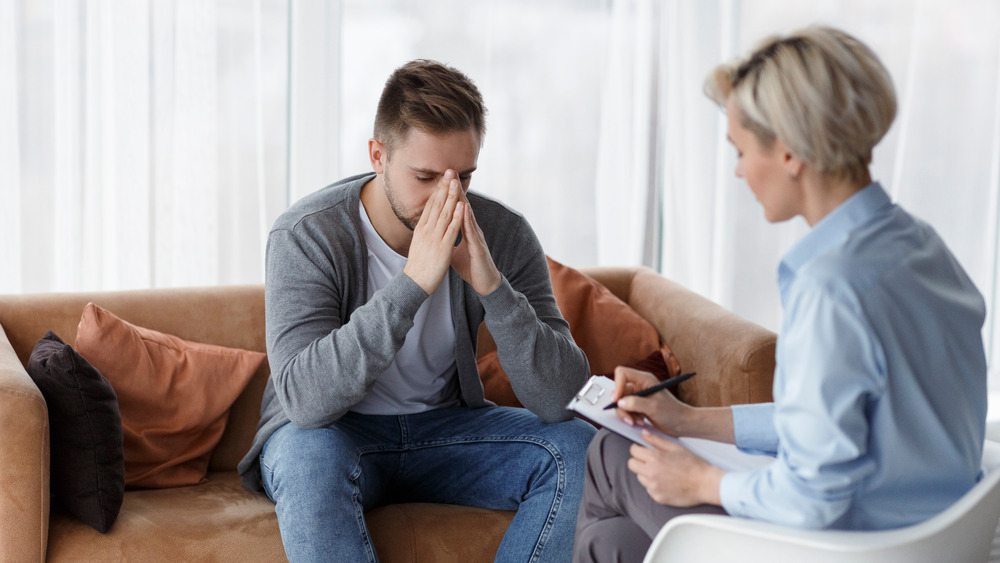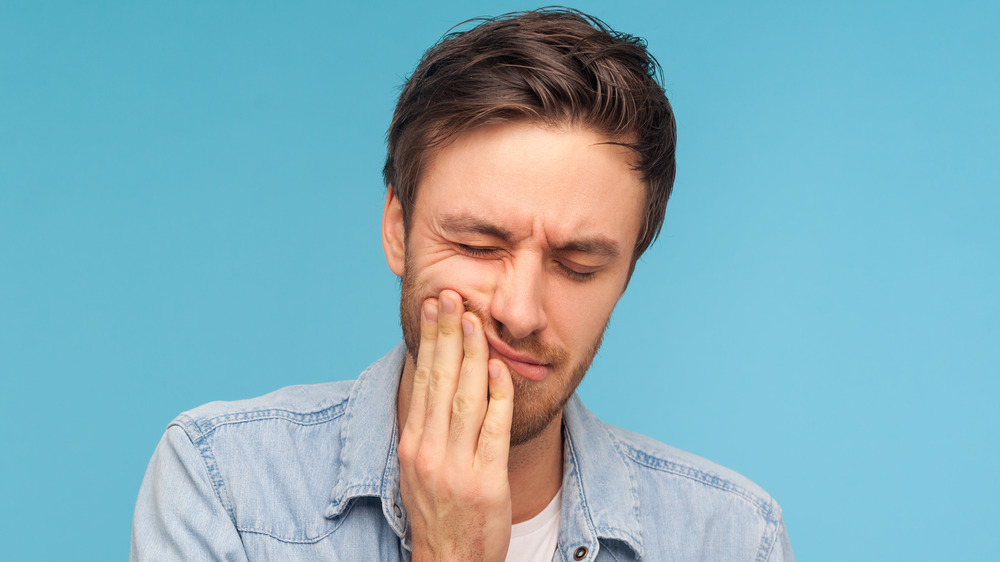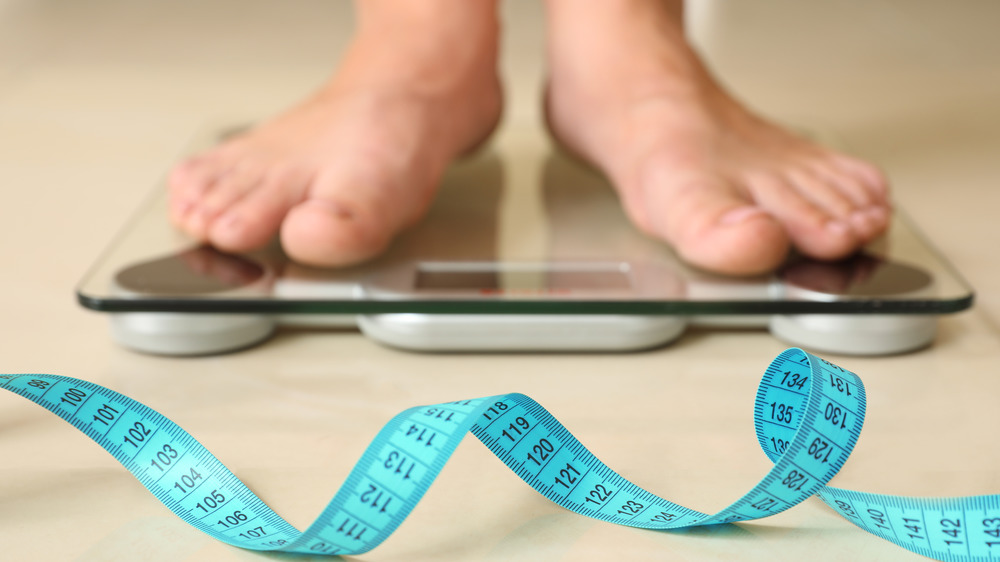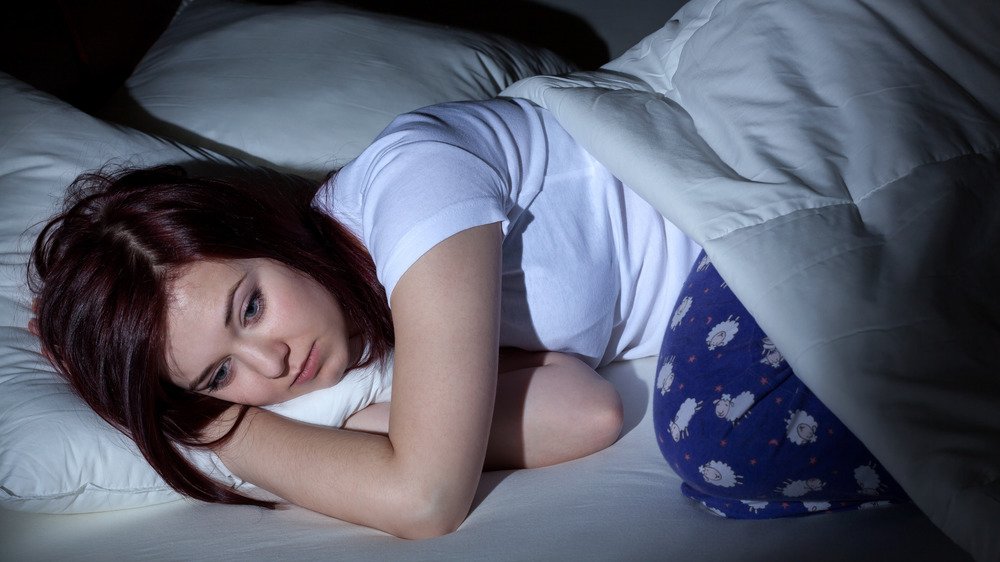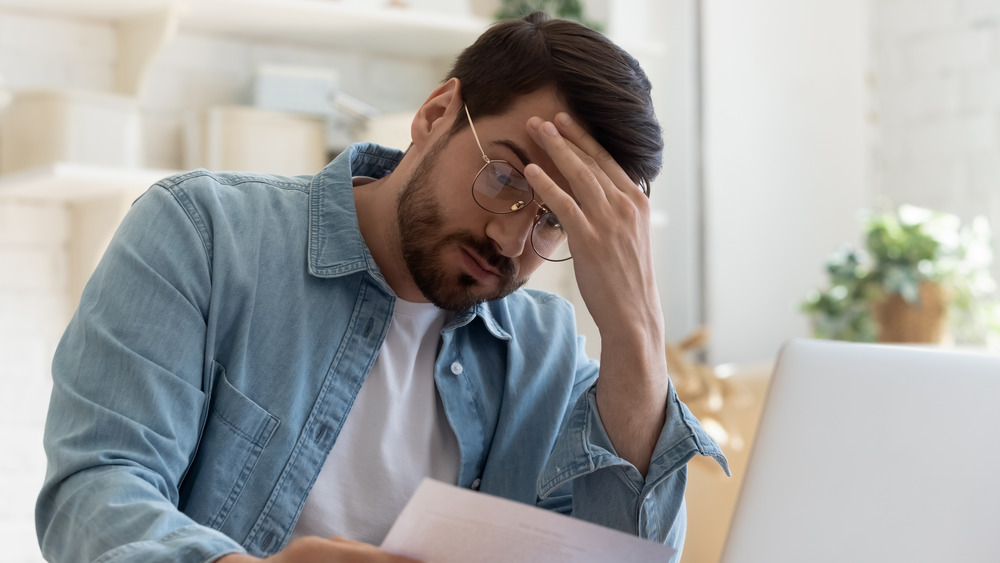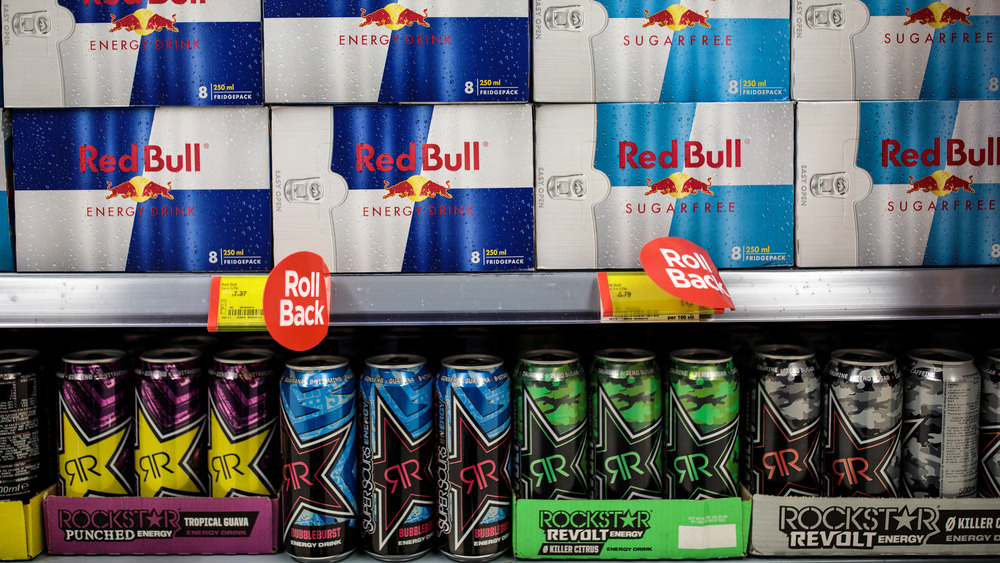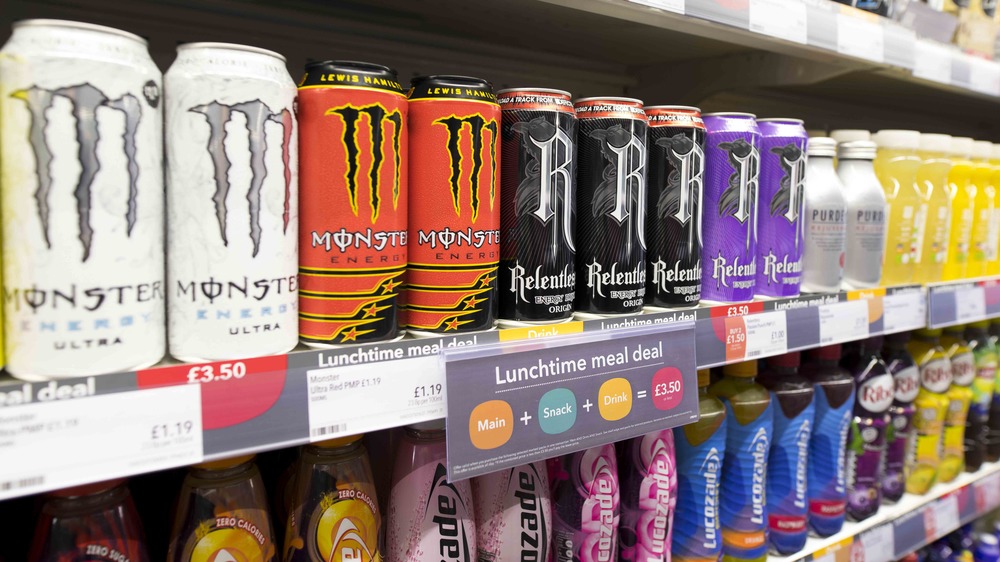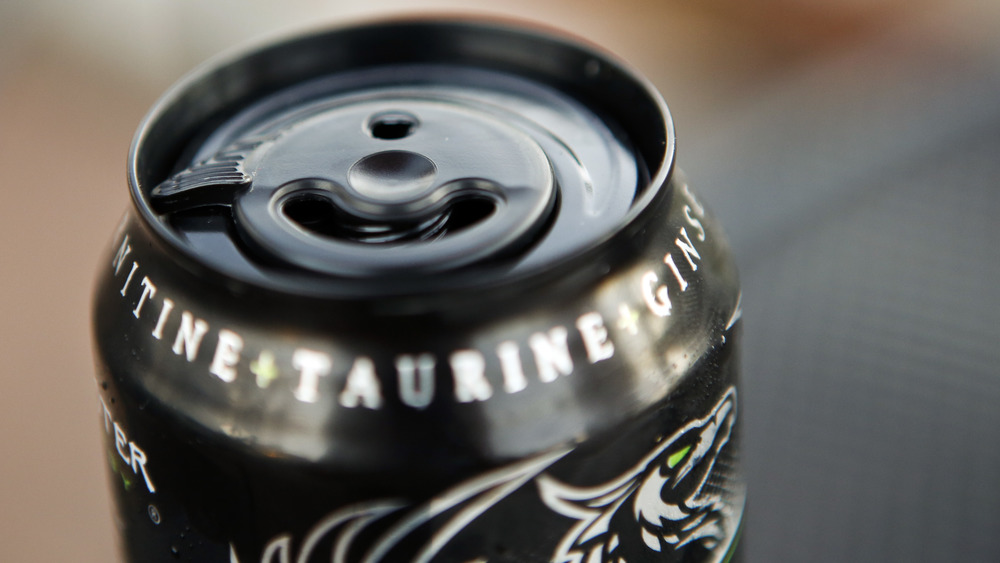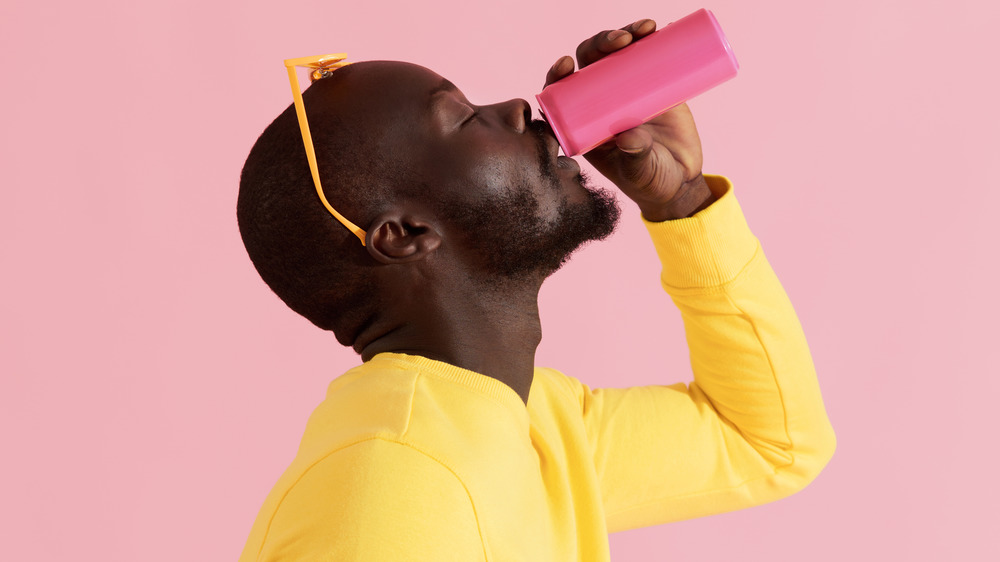You're Drinking Too Many Energy Drinks If This Happens To You
Energy drinks are a popular beverage choice. Considering their claims to enhance mental alertness, improve physical performance, and, of course, increase energy, it's no wonder people buy them. According to the National Center for Complementary and Integrative Health (NCCIH), men aged 18 to 34 and teens (aged 12 to 17) are the most frequent consumers of energy drinks.
The major ingredient found in these beverages is caffeine, with 70 to 240 milligrams in a 16-ounce drink and 113 to 200 milligrams per energy shot. "For comparison, a 12-ounce can of cola contains about 35 milligrams of caffeine, and an 8-ounce cup of coffee contains about 100 milligrams," the NCCIH revealed. Energy drinks also tend to contain an additional source of caffeine called guarana, as well as sugar, taurine, ginseng, and B vitamins.
Unfortunately, scientific evidence continues to grow around the serious health effects energy drinks can cause. If you're drinking too many, your body may try to let you know. Here are the common side effects you may experience.
You may be drinking too many energy drinks if your blood pressure increases
"Vasoactive metabolites," like the caffeine, taurine, sugar, and glucuronolactone found in energy drinks can wreak havoc on your cardiovascular health, a study published in the European Journal of Nutrition found. As part of the study, 25 healthy subjects participated in two experimental sessions in which they drank 355 milliliters of Red Bull or 355 milliliters of tap water on separate occasions. The results revealed that Red Bull consumption led to increase in both systolic and diastolic blood pressure, increased heart rate and cardiac output, increased breathing frequency, and decrease in cerebral blood flow velocity (the blood supply to the brain).
When blood pressure is high, your heart is putting in more work to pump blood to the rest of your body (via American Heart Association). As more time passes, the high blood pressure damages tissues inside arteries and can initiate atherosclerosis (buildup of fat and cholesterol in the artery walls). Ultimately all of this can lead to more serious problems like a heart attack or stroke.
Energy drinks make it easy to overdose on caffeine
Caffeine in small amounts can be tolerated by most people, but things start to get complicated once you've had too much. Certain conditions or medications can cause some people to have a sensitivity to caffeine and its effects. According to the FDA, healthy adults can drink up to 400 milligrams of caffeine per day, which is not associated with dangerous or negative effects.
However, an article published in Toxicology Reports revealed that doses of 500 milligrams have been shown to "increase tension, nervousness, anxiety, excitement, irritability, nausea, paresthesia, tremor, perspiration, palpitations, restlessness and possibly dizziness." Researchers noted that these symptoms can start up when serum concentrations of caffeine (the amount found in your blood) reach 15 mg/L. Once they reach 50 mg/L, they are considered "toxic" and become "lethal" at 80 mg/L.
Additionally, an article in the Institute of Medicine revealed that you can reach fatal levels if you drink 150 to 200 milligrams per kilogram of body weight, but extreme side effects can occur at 1 gram (15 mg/kg). The side effects included delirium, convulsions, rapid heart rate, and tremors.
Kidney damage can result from drinking too many energy drinks
The average person has two kidneys that sit just below the rib cage, one on each side of the spine. They are an important filtration system for the body. They remove waste and extra fluid and balance out minerals in our blood including calcium, sodium, phosphorus, and potassium (via National Institute of Health).
According to David Solondz, a physician at Providence Medical Group-Cascade, the excess caffeine in energy drinks can create damage to the kidneys over time. He mentioned that caffeine is a diuretic (substance that increases production of urine), which can cause dehydration and constrict blood vessels.
As one case report published in the Journal of Medical Case Reports highlighted, a 62-year-old woman began experiencing confusion, fatigue, poor sleep, nausea, and vomiting. Since she had a decreased appetite, she was eating very little food, but was drinking up to six cans of 16-ounce sugar-free energy drinks each day. Her lab tests showed "significant hepatic and renal dysfunction," which had been normal just two months prior. The belief is that acute kidney injury can come about from excessive taurine, as found in energy drinks. And acute hepatitis is linked with niacin, also found in energy drinks.
Your daily energy drink might be the reason you feel depressed and anxious
Energy drinks are often marketed to increase mental and physical energy as well as boost mood and performance. That may be the case short term, but there have been claims that chronic intake may actually have the opposite effect. According to a review article published in Frontiers in Public Health, there is an association between energy drink consumption and mental health including side effects such as stress, anxiety, depressive symptoms, and suicidal thoughts or attempts. In Canada, teenagers who drank energy drinks more than once a month were three times more likely to have depressive symptoms compared to those who did not drink energy drinks.
A study published in the Nutrition Journal had a similar outcome, especially when paired with junk food consumption. The results of the study found that energy drink intake was linked with sleep dissatisfaction, severe stress, and depressive mood. These side effects were more severe when five or more energy drinks were consumed each week.
If you or someone you know is struggling or in crisis, help is available. Call or text 988 or chat 988lifeline.org
You can thank energy drinks for those cavities
Sipping on your standard energy drink may result in drinking upwards of 40 grams of sugar (via The Nutrition Source). Sugary foods and drinks allow plaque bacteria to feed on the sugar to break down your enamel (the hard surface of your tooth), which leads to cavities, according to Healthline.
Switching to a sugar-free energy drink won't make as much of a difference as you'd think, though. "We are well aware of the damage that sugar does in the mouth and in the whole body — the role it can play in obesity, diabetes, etc. But the average consumer is not very well aware that acid does all kinds of damage, too," Poonam Jain, associate professor at the School of Dental Medicine at Southern Illinois University, told NPR.
Jain is the lead author of a study that looked to determine how energy drinks can impact teeth due to their high amounts of citric acid. The study took sliced pieces of molars and placed them in dishes containing either a sports drink or energy drink. They were soaked in the beverage for 15 minutes, and then were introduced to artificial saliva for a total of two hours. This was repeated four times a day for five days. In the end, both drinks impacted teeth enamel, but the "energy drinks took off a lot more," NPR explained.
Weight gain can result from drinking energy drinks
Is your energy drink responsible for those few extra pounds? "The calories in energy drinks (168 in a 12-ounce Red Bull can) are mostly due to the sugar content and likely to lead to weight gain if consumed in the long term," registered dietitian Kelly Hogan told GQ.
According to a report published in Pediatric Obesity, drinking two sugar-sweetened beverages daily for six months can create metabolic syndrome risks, which includes obesity. When intake is lowered, however, weight gain is reduced.
Even if you opt for sugar-free, calorie-free energy drinks, you may still put on some weight. "The advantage is that there is no calorie count from artificial sweetener," physician and president and CEO of Family Medicine Residency of Idaho, Ted Epperly, said when speaking with GQ. The disadvantage? Your body compensates for the lack of calories by eating more food. "You're not turning off your hunger mechanism from increased calories," Epperly continued.
If you're having trouble sleeping, consider cutting back on energy drinks
Caffeine can keep you alert and energized throughout the day — but that can wind up backfiring when you're ready to get some sleep. You see, we have a "sleep-promoting chemical" in our brain called adenosine, which gets produced and continues to build up the longer we're awake, according to the National Sleep Foundation. The more adenosine in our brain, the sleepier we feel.
Caffeine, however, blocks adenosine receptors, causing us to be alert when bedtime nears. Not only that but caffeine has been linked with reduced slow-wave sleep, which is the deep, restful sleep that gives us a refreshed feeling in the morning.
A study published in Health found that participants who drank three or more stimulant beverages, such as energy drinks, had a bigger chance to deal with poor sleep, which led to daytime dysfunction, reduced sleep, and the use of sleep medication. Additionally, a study published in the Journal of Clinical Sleep Medicine even found that drinking caffeine some six hours before bed could reduce sleep time by an hour.
The caffeine in energy drinks could be the cause of your headaches
Due to its ability to stimulate the brain, constrict blood vessels, and cause dehydration, the caffeine in energy drinks can leave you dealing with headaches. A study published in The Journal of Headache and Pain found that when the study participants discontinued caffeine intake, they had improvements with migraines.
Unfortunately, cutting back on caffeine too quickly can make matters worse. When you consume caffeine on a regular basis, your body can become dependent on it. This can trigger a caffeine withdrawal if you stop caffeine intake abruptly.
According to an article published in StatPearls, withdrawal symptoms can differ for each individual, but research has shown that "the incidence of a headache is about 50%." This can start around 12 to 24 hours after stopping caffeine, peak at around 20 to 51 hours, and last for as many as nine days. If you're looking to scale back on how many energy drinks, you should consider doing so at a gradual pace rather than going cold turkey.
An energy drink isn't going to help your stress
We all deal with stress but add energy drinks to the mix and it may be more intense than usual. Even drinking one energy drink can create an increase in stress hormones. Dr. Anna Svatikova, a cardiologist and lead researcher of a study published in JAMA, told WebMD that young adult participants had a 74 percent increase in norepinephrine, the fight-or-flight hormone, after drinking a 16-ounce can of "Rockstar Punched."
She added that those levels were more than twice the average increase in norepinephrine the participants experienced after they drank a placebo energy drink. The placebo contained the same amount of calories and sugar, but it was missing caffeine, taurine, ginseng, guarana, and milk thistle — the ingredients normally found in energy drinks.
With this drastic increase in stress hormones in young, healthy individuals, Svatikova voiced her concerns for others. In the same interview with WebMD, she said, "The worry is that if these responses are seen in healthy young people, perhaps the effects of energy drinks may be more pronounced in people who already have high blood pressure or arrhythmias."
Energy drinks can result in sticky blood
When there's too many cells and proteins floating around in your blood, thick blood is formed, which is the culprit to blood clotting. Pair that up with the constricted blood vessels and increased heart rate energy drinks can cause, and you have a combination that could lead to disaster.
A study published in Controlled Clinical Trial assessed 50 healthy volunteers after they drank one can of a sugar-free energy drink. The results found that after drinking the energy drink, there was a significant increase in platelet aggregation, which is when blood cells clump together and form a blood clot (via Healthline).
This "sticky" or thick blood is believed to be the reason behind cardiovascular problems. "One hour after they drank Red Bull, [their blood systems] were no longer normal," Scott Willoughby, one of the lead researchers of the study, said in an interview with Reuters. "They were abnormal like we would expect in a patient with cardiovascular disease." Beyond heart complications, thick blood could also create a stroke if the blood clot moves to the brain or could injure your kidneys.
Energy drinks put you at risk for type 2 diabetes
The high amount of sugar commonly found in energy drinks increases your risk of metabolic disorders, including type 2 diabetes. A study published in the International Journal of Environmental Research and Public Health found that drinking energy drinks increased blood glucose levels significantly by an average of 21 percent. With this increase in blood glucose comes adverse health effects, including insulin resistance which is associated with type 2 diabetes.
It's not just the sugar that can create this risk, though; it's also the caffeine. One study found that teens had a 25 percent increase in blood sugar and insulin after having a sugar-free energy drink that 208 milligrams of caffeine compared to a decaf version (via News24). Chief science officer for the Canadian Diabetes Association, Dr. Jan Hux, said this is concerning since insulin levels also increased, which have a role in keeping blood sugar levels balanced. "You'd think if the insulin is high, the sugar should go down," she told the site. "That suggests that the caffeine is causing insulin resistance."
Constantly getting stomachaches? Look no further than your energy drink
Put down the antacids for you bellyache and instead decrease your energy drink intake. Your gastrointestinal tract (all the organs that are part of digestion) can actually speed up from the stimulant capabilities of caffeine (via Michigan Health). When food moves too quickly from your stomach to the beginning of your small intestine, you may experience nausea, stomach pain, or even bad "rumbly" stomach noises, according to the National Institute of Diabetes and Digestive and Kidney Diseases.
The sugar-free energy drinks that contain artificial sweeteners can also make your belly hurt. Consuming too much can lead to uncomfortable bloating, gas, and diarrhea. "If you have IBS (irritable bowel syndrome) or IBD (irritable bowel disease), excess amounts of refined sugar at one time may lead to GI distress since the sugar may not absorb well into your intestines," registered dietitian nutritionist Emily Haller wrote for Michigan Health. She went on to add, "When this happens, the GI tract draws water into the bowel to dilute and flush out excess sugar, which can lead to more unwanted, and unexpected, bathroom runs."
You may risk premature death by drinking energy drinks
Death is, of course, the most severe complication of drinking too many energy drinks, and one worth being aware of. A report published in Case Reports detailed the experience of a 28-year-old male who was admitted to the ER with ventricular tachycardia, an irregularly fast heartbeat. This patient had consumed three cans of energy drinks five hours before a basketball game. Before playing, the man started experiencing nausea and an abnormal heartbeat. Just a half-hour into the game, he lost consciousness and, after three days in the hospital, died.
Another case report was shared with The U.S. Sun by Cassondra Reynolds, who lost her 41-year-old husband, John. Cassondra said in the interview, "John was healthy, he worked out every day, he had a full physical examination the month prior [to going into cardiac arrest] and all his results came back fine." She continued, saying, "Eventually, the doctor asked me if he drank energy drinks which I replied yes, but only once a day. He immediately explained that it only takes one energy drink to throw off the rhythm of your heart causing a heart arrhythmia."
Is there a safe amount to drink?
Is there such a thing as a "safe" amount when it comes to energy drinks? Well, sticking with a caffeine intake of no more than 400 milligrams per day is likely a good start. It's hard to pinpoint exactly how many energy drinks that entails since the caffeine content varies by beverage and brand (via Mayo Clinic). The caffeine amount listed on the can could also be an underestimation, since ingredients like guarana can add more caffeine to the mix, according to the National Center for Health Research.
Even though caffeine is generally safe for adults, children should avoid energy drinks and other caffeinated beverages completely, and women who are pregnant or trying to become pregnant should limit their caffeine intake to 200 milligrams daily. Adolescents between the ages of 12 to 18 should not exceed 100 milligrams of caffeine daily (via CDC).
There is additional concern regarding all of the ingredients energy drinks entail and the negative impact they may have on your health. Therefore, your safest bet may be to eliminate energy drinks from your diet altogether.

